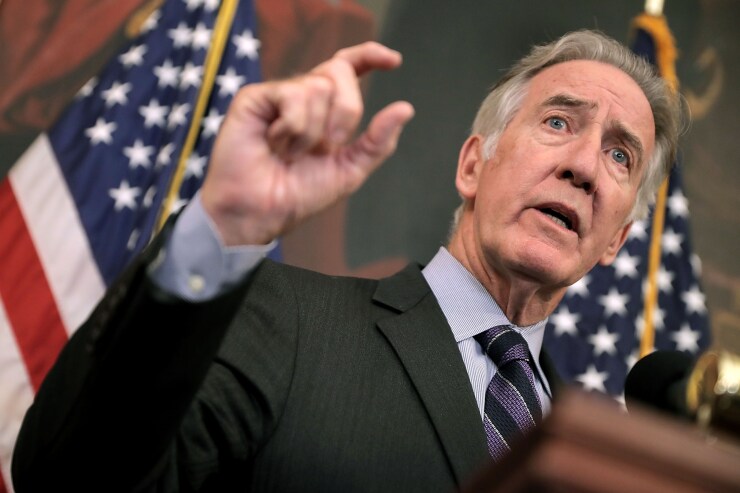The sharp divergence between Republicans and Democrats over the 21 percent corporate income tax rate was on display Tuesday at the House Ways and Means Committee as Democrats began making the case for a large increase should their party succeed in November’s elections.
Several Democratic presidential candidates — including Senators Bernie Sanders, Elizabeth Warren, and former South Bend, Indiana, Mayor Pete Buttigieg — propose pushing the rate as high as 35 percent, its level before a Republican Congress enacted a massive tax cut in 2017.
President Donald Trump has advocated for a rate as low as 15 percent, creating a 20 percentage point spread between leaders in the two parties.
That amounts to a win for the status quo, essentially locking in the Republicans’ 21 percent corporate rate for several more years unless Democrats sweep control of Congress and the White House.
“The corporate income tax falls short of what our country needs,” House Ways and Means Chairman Richard Neal (pictured), a Massachusetts Democrat, said at Tuesday’s hearing. “Corporations are paying less than ever, and corporate tax revenues are at their lowest level in history outside of a major recession.“

Acceptable rates
The window of acceptability in each party has shifted in opposite directions.
Republicans tout their tax law as a key victory and are preparing to push for a second round of cuts if Trump keeps his job for another four years — though that would be tricky unless the GOP also wins back the House. Democrats, eager to raise revenue for new social programs, want corporations to pay significantly more.
As recently as five years ago, Democrats and Republicans alike widely backed corporate tax rates in the mid-to-high 20s. President Barack Obama called for a 28 percent rate, while former House Ways and Means Chairman Dave Camp, a Republican who didn’t seek re-election in 2014, pushed for a 25 percent rate during his tenure.
Several centrist Democrats seeking their party’s 2020 presidential nomination are supporting rates in that former centrist ground. Former vice president Joe Biden and former New York City mayor Mike Bloomberg have both called for a 28 percent corporate rate, while Democratic Senator Amy Klobuchar backs a 25 percent rate. Bloomberg is the founder and majority owner of Bloomberg LP, the parent company of Bloomberg News.
The two parties can’t even agree on how to read the data on corporate tax collections since the 21 percent rate took effect in 2018. Democrats point to data showing that corporate tax receipts have fallen in comparison to gross domestic product.
Percentage of GDP
The Joint Committee on Taxation projects that corporate income collection in 2019 will be about 1.1 percent of GDP, in line with 2018. The average corporate tax collection as a percentage of GDP for the previous five years was 1.7 percent, according to the nonpartisan congressional tax scorekeeper.
Republicans say the dollar amount collected rose in 2019 to about $230 billion, up from nearly $205 billion in 2018.
“Corporate taxes aren’t disappearing, they are growing — more than 12 percent last year,” Representative Kevin Brady, the top Republican on the Ways and Means Committee, said Tuesday. “Corporate revenues are set to rise over the next decade both in real dollars and as a percent of GDP,” he said, citing the Congressional Budget Office.
CBO has said the corporate tax law hasn’t greatly exceeded or fallen short of its projections.
“Our





